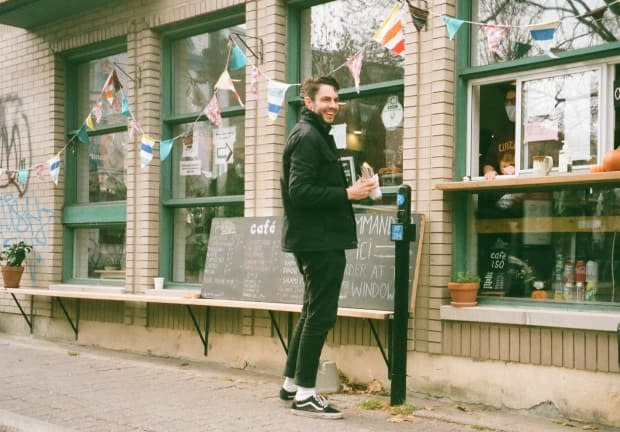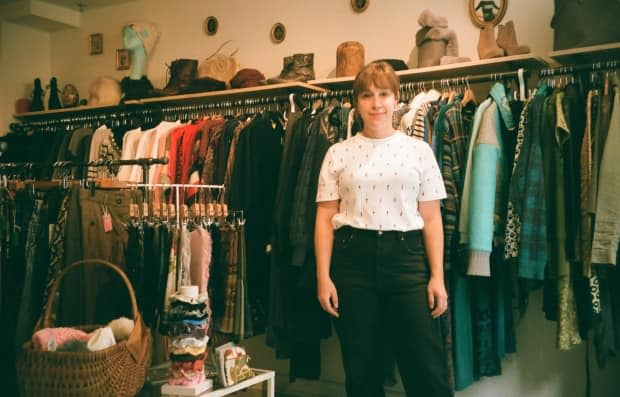Small businesses on Montreal's Duluth Avenue are adapting amid pandemic restrictions
Outside Chez José, customers wait on benches fastened to the colourful facade. Lovers embrace, friends chat, others share a sandwich.
Inside, the dining area may have partly been turned into storage, but the bustle is uncharacteristic for the quiet that's set in all over the city. The kitchen is busy and owner Rachel Leroyer Henriques is joking with staff members and her brother who stopped by.
This is lunchtime on Duluth.
A lineup stretches outside Capitaine Sandwich, another along Café Iso; a sandwich board outside the revamped District 4 advertises fresh Banh Mi and Phở. Pedestrians, perhaps on a working-from-home break, amble up and down the uneven cobblestone.
Dine-in is out, and takeout is in.
Once known for its bring-your-own-wine restaurants, Duluth Avenu is seeing more new businesses run by young entrepreneurs and that may be one of the reasons it's adapted to pandemic restrictions that have been otherwise hard on local merchants.
"We've been pretty lucky," says Café Iso owner Isobel Gibson-Flader. "Something changed in the middle of the summer. We got our terrasse permit so we could put some tables outside. We wanted to just bring a bit more colour and life onto our street."
Café Iso is one of several businesses on Duluth that opened shortly before the pandemic hit or right in the middle of it. Gibson-Flader describes the restaurant as a "café de quartier," which now operates out of a small takeout window.

Gibson-Flader changed the fare from full-on plates to sandwiches and other foods that are easy to grab and go.
The café, like many other restaurants and businesses on the street, closed early on in the pandemic and suffered through some slow months. Then, it started hosting barbecues on weekends this summer.
"I would say since then it's been consistently much, much steadier," Gibson-Flader said. "Maybe because people are used to the new pace of life, which is going out and a lot more walking, a lot more outdoor time."
Opening 2 weeks before the pandemic
Bee's Knees, a vintage clothing consignment store near the corner of Saint-Denis Street, was open just two weekends before things shut down in March.
Co-owners Stéphanie Nolin and Nelly Diamond immediately took the business online, advertising its website in the window and building an Instagram following.
"That's how we survived those times," Nolin said from inside the shop that warm November afternoon.

The two had invested lots of money into significant renovations to transform the space into their store, but Nolin says the impact from the pandemic was softened by a discount on rent from their landlord and other government aid.
"With the help, we kept our heads above water," she said. The extra time and focus on establishing Bee's Knees online also helped the pair get to know their competitors, with whom they've created partnerships and a kind of community of vintage sellers.
Taking over the family restaurant
Anh-Dao Bui wasn't even thinking of opening a business in March. She'd just been laid off after 20 years in production at Cirque du Soleil, along with hundreds of other colleagues.
Her aunt and uncle, who owned Vietnamese restaurant L'Harmonie d'Asie on Duluth for 30 years, closed in April and decided not to reopen.
Soon, getting antsy, Bui saw an opportunity. She decided to take it off their hands, redecorate and rename it, and take advantage of the career change.
"My daughter is seven and I want to be able to spend more time with her, and have my nights and weekends off," Bui said, sitting in one of the tree planters lining the street.
She got local street artists to paint the outside, as well as some pieces inside of the restaurant. Her daughter and her niece painted colourful flowers on the walls of the bathrooms, and Bui installed two deep red theatre chairs at the entrance, an homage to her suffering entertainment industry.

Bui made a new menu with straightforward takeout options and called the restaurant District 4, after a fabled neighbourhood in Ho Chi Minh City — "it's like the red light [district], all the things that you cannot do and that's where my family comes from."
Her mom and another aunt have been preparing the food in the kitchen, continuing in the restaurant's family affair tradition. But Bui isn't making any illusions about how easy the road ahead is for establishments like hers.
"It's a very hard time for restaurants, so that's why my family is contributing a lot."
To share the street, or not to share the street
Luke Martin, treasurer for the street's business association, Association des commerçants de l'Avenue Duluth, says that while some have flourished, other merchants have quietly vanished.
One restaurant owner stopped paying rent and never came back, Martin said. Now, his space is being rented out by a restaurant that is expanding amid the pandemic.
Martin says he's noticed more investment from newer and younger entrepreneurs on the street.
"They're a lot more engaged and wanting to participate in our street. It's always nice to see."
The association has tried to do some things to alleviate some of the pandemic pressure from merchants, beautifying the street by commissioning artists to paint on walls and the sidewalk.
This summer, Martin pushed for a shared street between pedestrians and cars as a compromise between those who wanted no change and those who wanted only foot traffic.
But the lack of parking was especially hard on some of the street's older businesses, while it was great for others who benefited from the added space for outdoor seating.
Still, Martin points out, Duluth is one of the streets with the lowest commercial vacancy rate in the Plateau-Mont-Royal borough, something he attributes to its location near the mountain, Saint-Laurent Boulevard, and a community feel.
Nestor Read tries to shop and eat in the area as much as he can. He owns a matcha joint on Rachel Street, so he knows how important it is to support local.
"Every day, it's a small thing. I go see this neighbour, this neighbour, this neighbour. That's how i discover things," said Read, who had just picked up some chicken from Chez José.
"And you know you keep enjoying life that way."


